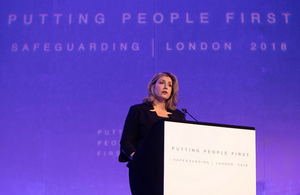Safeguarding Summit 2018: Global aid community to take action against sexual predators
More than 500 delegates from across the international aid community to commit to a “root to branch” change in the way the sector operates.

International Development Secretary Penny Mordaunt speaking at the Safeguarding Summit. Picture: DFID/Michael Hughes
International Development Secretary Penny Mordaunt today (Thursday 18 October) galvanised the support of more than 500 delegates from across the international aid community to commit to a “root to branch” change in the way the sector operates.
At the landmark International summit, Ms Mordaunt welcomed delegates from the United Nations, World Bank Group, international financial institutions, research organisations, survivors and NGOs who all agreed to sign up to tough global standards to stop sexual predators abusing vulnerable people around the world.
All the major international donors – covering 90 per cent of global aid - today committed to worldwide standards on the prevention of sexual exploitation and abuse. These standards cover ethical behaviour, recruitment and complaints processes.
They will be backed up by stronger due diligence processes, better project monitoring, and tougher language in funding agreements.
Donors will also publish relevant information about allegations and confirmed cases and will be subject to regular independent review by the Organisation for Economic Cooperation and Development.
The commitments announced by different groups representing the sector focused on four key themes:
-
preventing sexual exploitation and abuse and sexual harassment from happening in the first place;
-
pledging to listen to those who have been affected;
-
removing and addressing barriers to reporting sexual exploitation, abuse and harassment; and
-
learning more quickly in future, as new evidence and opportunities emerge.
The Department for International Development (DFID) has today committed £20 million in research funding to improve understanding of the risks people affected by conflict face, including those subjected to sexual exploitation.
The research will make a valuable contribution in helping to determine what can be done to avoid and mitigate the risks associated with exploitation and harm and what we all can do to effectively safeguard people who are trusting us to care for them.
After the summit, International Development Secretary Penny Mordaunt said:
Let there be no doubt this international summit was not about gathering promises to tinker around the edges. This is about setting in place a fundamental rewrite, from root to branch, of the way the aid sector operates.
It is incredibly important that as we work to tackle sexual exploitation and abuse in the aid sector we put the voices of victims and survivors first. Which is why we dedicated the first half of the day to listening to their accounts and hearing from those on the frontline.
This is not the end of the process. There is still a huge amount of work to do but these commitments and the new tools we have outlined today send a message to perpetrators – your time is up, there is nowhere to hide.
The summit has also seen major commitments from the sector including:
- a new Disclosure of Misconduct Scheme which will prevent known perpetrators moving around undetected – at least 15 organisations have signed up to this so far, amounting to approximately 50,000 staff worldwide;
- the Disasters Emergency Committee announcing that it will explore with members joint complaint-handling systems for communities raising concerns in future emergencies, along with a review of how they respond to community feedback, including in Cox’s Bazar, Bangladesh; and
- all donors and other participants committing to having at least one named senior level champion accountable for work on safeguarding issues and to encourage annual discussions at board level.
DFID also announced a number of measures today.
- An Interpol pilot to improve background checks on staff who work in the aid sector and provide advice to employers on international vetting and identifying high-risk individuals. This will also lead to better information sharing across borders and help close the net on predators who are using the aid sector as a cover to abuse and exploit.
- Support for NGOs to test a new passport for aid workers to prove an individual’s identity, provide background information and vetting status.
- DFID and the Foreign and Commonwealth Office will be supporting the development of a statement of victims’ rights. This statement will allow people to understand their rights, and to have confidence that they can find help if those rights are threatened or violated.
ENDS
General media queries (24 hours)
Email mediateam@dfid.gov.uk
Telephone 020 7023 0600
If you have an urgent media query, please email the DFID Media Team on mediateam@dfid.gov.uk in the first instance and we will respond as soon as possible.